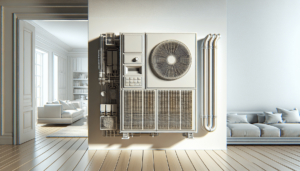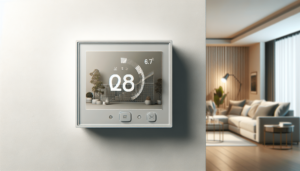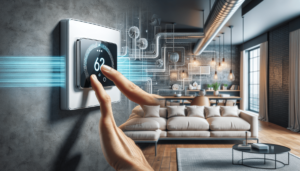

HVAC Services
Get Professional Repairs From The Area's Trusted HVAC Technicians. Ask About Our Services! We Offer Professional Heating & Cooling System Repairs And Guarantee Long-Lasting Results.
Got Question? Call us: (850) 678-2665Financing
Ways To Improve Indoor Air Quality With Your HVAC
If you’re concerned about the quality of the air inside your home, your HVAC system could be the key to improving it. With the right practices and maintenance, your HVAC system can help to provide cleaner, healthier air for you and your family to breathe. In this article, we’ll explore some simple yet effective ways to enhance your indoor air quality using your HVAC system. From regular filter changes to proper ventilation, we’ll guide you through the steps to create a healthier living environment. So, let’s get started on the path to fresher air and a more comfortable home.
Regular Maintenance
Regular maintenance of your HVAC system is crucial for maintaining good indoor air quality. Here are some key tasks that you should prioritize:
Change air filters regularly
Air filters play a vital role in trapping dust, allergens, and other pollutants, preventing them from circulating throughout your home. It is recommended to change your air filters every three months or according to the manufacturer’s instructions. Neglecting to change the filters can lead to a buildup of debris, reduce airflow, and decrease the efficiency of your HVAC system.
Clean air ducts
Over time, dust, dirt, and other contaminants can accumulate in your air ducts, affecting the air quality in your home. Regular duct cleaning helps remove these pollutants, ensuring that the air circulating through your HVAC system is clean and fresh. Consider hiring a professional duct cleaning service to thoroughly clean the ducts and eliminate any potential sources of indoor air pollution.
Check for leaks and seal ducts
Leaky air ducts can lead to the loss of conditioned air and the infiltration of pollutants from unconditioned spaces. Inspect your ductwork for any visible leaks and seal them using duct sealant or metallic tape. By sealing your ducts properly, you can prevent the entry of dust, mold, and other contaminants into your home.
Clean condenser coils
The condenser coils in your HVAC system play a crucial role in cooling the air. However, these coils can accumulate dirt, debris, and even mold over time, hindering their efficiency. Regularly cleaning the condenser coils, either by yourself or with the help of a professional, can improve the performance of your HVAC system and ensure cleaner air circulation.
Inspect and clean exhaust vents
Exhaust vents, such as those in your kitchen and bathroom, are responsible for removing moisture, odors, and pollutants from your home. These vents can become clogged with dirt, grease, and lint, reducing their effectiveness. Regularly inspect and clean your exhaust vents to ensure optimal airflow and efficient removal of indoor pollutants.
Proper Ventilation
Proper ventilation is essential for maintaining good indoor air quality. Here are some effective ways to ensure adequate ventilation in your home:
Install a whole-house ventilation system
A whole-house ventilation system works by exchanging stale indoor air with fresh outdoor air. These systems typically include fans, filters, and ductwork to distribute fresh air throughout your home. By installing a whole-house ventilation system, you can ensure a constant supply of fresh air, filtering out pollutants and maintaining a healthy indoor environment.
Open windows and doors for fresh air
Opening windows and doors is a simple yet effective way to increase natural ventilation and allow fresh air to enter your home. This method is particularly useful on mild weather days when outdoor air quality is good. However, be cautious about outdoor air pollution levels and consider using window screens to prevent the entry of insects and other outdoor pollutants.
Use exhaust fans in kitchens and bathrooms
Exhaust fans in kitchens and bathrooms help remove odors, moisture, and pollutants generated in these areas. Make sure to use these fans while cooking or taking hot showers to reduce the buildup of humidity and prevent the spread of odors and contaminants throughout your home. Clean and maintain the fans regularly to ensure their optimal performance.
Control Humidity
Controlling the humidity levels in your home is crucial for maintaining a comfortable and healthy indoor environment. Here are some methods to effectively manage humidity:
Use a dehumidifier
Excessive humidity can lead to mold growth, musty odors, and respiratory issues. Use a dehumidifier in areas of your home that tend to have higher humidity levels, such as basements or bathrooms, to remove excess moisture from the air. Regularly empty and clean the dehumidifier to prevent the buildup of mold or bacteria.
Install a humidifier
On the other hand, low humidity levels can cause dry skin, respiratory problems, and even damage to wooden furniture and flooring. Installing a humidifier can help add moisture to the air, especially during the dry winter months. Choose a humidifier suitable for the size of the room and maintain it properly to avoid the growth of mold or bacteria.
Maintain ideal humidity levels
The ideal humidity level for most homes is between 30% and 50%. Use a hygrometer to monitor the humidity levels in your home and take appropriate actions to maintain them within this range. This may involve adjusting the use of humidifiers or dehumidifiers and ensuring proper ventilation to optimize indoor air quality.
Choose the Right Air Filters
Selecting the right air filters for your HVAC system is crucial in improving indoor air quality. Here are some factors to consider when choosing air filters:
Select filters with high MERV ratings
MERV (Minimum Efficiency Reporting Value) ratings indicate the effectiveness of air filters in capturing particles of different sizes. Higher MERV ratings indicate superior filtration efficiency. Choose air filters with MERV ratings of 8 or higher to ensure effective removal of airborne contaminants.
Consider HEPA filters for better air purification
HEPA (High-Efficiency Particulate Air) filters are renowned for their ability to capture tiny particles, including allergens, dust mites, and pet dander. Consider using HEPA filters in your HVAC system or in standalone air purifiers to improve the air quality, especially for individuals with respiratory conditions or allergies.
Change filters regularly
Regardless of the type of filters you choose, it is essential to change them regularly as recommended by the manufacturer. Dirty or clogged air filters impede airflow, reduce the efficiency of your HVAC system, and allow pollutants to circulate in your home. Set a reminder to replace your air filters every three months or as advised.







